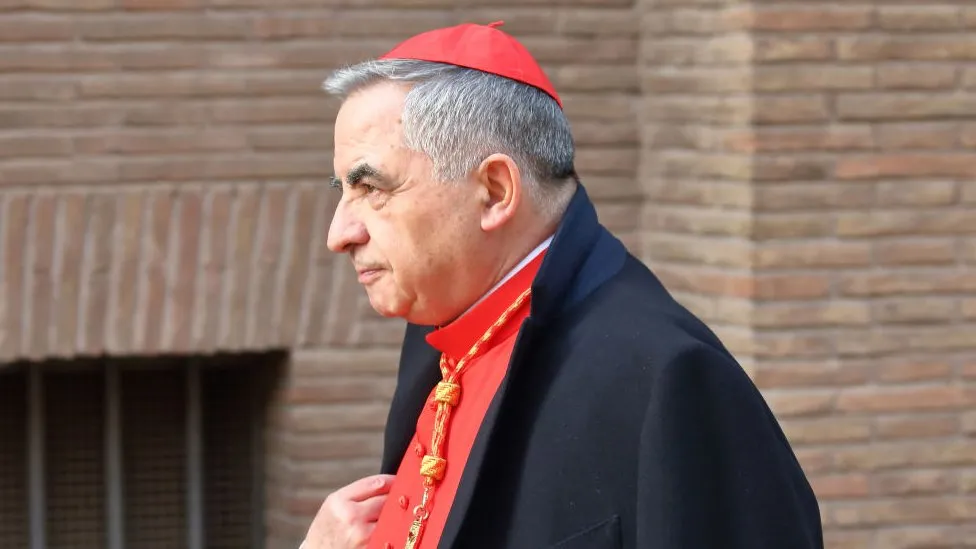A Vatican court has sentenced Italian Cardinal Angelo Becciu, a former adviser to Pope Francis, to five-and-a-half years in jail for financial crimes.
Becciu, 75, was the most senior Vatican official ever to face such charges and once seen as a papal contender himself.
The trial centred on a London property deal that ended in huge losses for the Catholic Church.

He strongly denied charges including embezzlement and abuse of office.
Cardinal Becciu’s lawyer said his client was innocent and would lodge an appeal.
He was on trial with nine other defendants. All were convicted on some counts and found not guilty on others.
The trial, which exposed infighting and intrigue in the highest Vatican ranks, had been going on for two-and-a-half years.
After three judges spent more than five hours considering the verdict, Court President Giuseppe Pignatone announced that Cardinal Becciu had been convicted of embezzlement.
The others, who included financiers, lawyers and ex-Vatican employees, were accused of various crimes, including fraud, money laundering and abuse of office. They all denied wrongdoing.
“We reaffirm Cardinal Angelo Becciu’s innocence and will appeal,” stated Becciu’s lawyer, Fabio Viglione, after the verdict. “We respect the ruling, but we will definitely appeal.”
The case – the first of a Cardinal standing trial in a Vatican court – was the stuff of intrigue and skulduggery. It involved allegations of financial impropriety at the top of the Vatican, cloak-and-dagger activity of the kind that has often characterised the secretive world of the Holy See.
It centred around a building not in the Vatican, or even in Rome, but a thousand kilometres away in London – 60 Sloane Avenue in affluent Chelsea, a former warehouse belonging to the department store Harrod’s.
In 2014, the Vatican spent more than €200m ($220m; £170m) acquiring a 45% stake in the building, which was planned to be converted into luxury apartments. By 2018, the Vatican’s Secretariat of State had decided to buy the property outright, sinking a further €150m euros into the purchase. Allegedly signing off on the whole deal was Cardinal Becciu, who was at the time the Vatican’s Substitute for General Affairs – in effect chief of staff to the Pope.
The money, part of which was intended to be used for charitable works, had been paid into a trust run by a London-based Italian financier Raffaele Mincione, who orchestrated the purchase. When the Secretariat later sought financial help from the Vatican’s own bank, it sparked concern – and a raid by Vatican police that led to the charges against Becciu, Mincione, and eight others.
But the investigation into Becciu’s affairs wasn’t limited to the London property deal.
The cardinal was also accused of funnelling vast sums of money to his home diocese of Sardinia, some of which reportedly benefited his family. And it was alleged he paid almost €600,000 to another of the accused, Cecilia Marogna, to help free a nun kidnapped in Mali. Prosecutors said she instead spent much of the money on luxury goods and holidays. Marogna, who had offered her services to the Vatican as an intelligence expert, visited Becciu’s residence on several occasions. Both denied claims of a sexual relationship.
The charges against Becciu made him the first cardinal ever tried for financial crimes. It also prompted Pope Francis to strip him of rights including that of voting in a future conclave to select Francis’s successor.
After he was removed from office by the Pope in 2020, he gave a news conference to plead his innocence.
“Until 6:02 p.m. on Thursday I felt like a friend of the Pope, a faithful executor of his will,” Cardinal Becciu said. “Then the Pope says he no longer has faith in me.”
The whole affair became a test case for Pope Francis’s aim of clearing up the Vatican’s finances, which were long plagued by scandal, bedevilling the papacy of Francis’s predecessor, Benedict XVI.
The result of the case could have significant implications for Francis’s legacy as a reformer.
